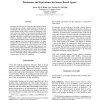126
click to vote
AAAI
2007
15 years 4 months ago
2007
We present a method of visualizing and adjusting the evaluation functions in game programming in this paper. It is widely recognized that an evaluation function should assign a hi...
116
click to vote
AAAI
2007
15 years 4 months ago
2007
The mean running time of a Las Vegas algorithm can often be dramatically reduced by periodically restarting it with a fresh random seed. The optimal restart schedule depends on th...
141
click to vote
AAAI
2007
15 years 4 months ago
2007
General Game Playing (GGP) is the art of designing programs that are capable of playing previously unknown games of a wide variety by being told nothing but the rules of the game....
126
click to vote
AAAI
2007
15 years 4 months ago
2007
Accurately locating users in a wireless environment is an important task for many pervasive computing and AI applications, such as activity recognition. In a WiFi environment, a m...
AAAI
2007
15 years 4 months ago
2007
131
click to vote
AAAI
2007
15 years 4 months ago
2007
Solving logic puzzles has become a very popular past-time, particularly since the Sudoku puzzle started appearing in newspapers all over the world. We have developed a puzzle gene...
120
click to vote
AAAI
2007
15 years 4 months ago
2007
This paper describes recent results from the robotics community that develop a theory, similar in spirit to the theory of computation, for analyzing sensor-based agent systems. Th...
140
click to vote
AAAI
2007
15 years 4 months ago
2007
The exponential growth and reliability of Wikipedia have made it a promising data source for intelligent systems. The first challenge of Wikipedia is to make the encyclopedia mac...
121
click to vote
AAAI
2007
15 years 4 months ago
2007
Coordinating a group of robots to work in formation has been suggested for a number of tasks, such as urban searchand-rescue, traffic control, and harvesting solar energy. Algorit...
137
click to vote
AAAI
2007
15 years 4 months ago
2007
In timed, zero-sum games, the goal is to maximize the probability of winning, which is not necessarily the same as maximizing our expected reward. We consider cumulative intermedi...

